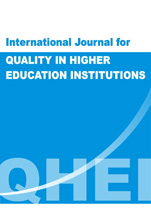Author guidelines
On behalf of the editorial board, we are pleased to inform you that we are continuously accepting manuscripts for the next issues. The journal has two versions (English and Romanian) and it is published twice a year, on-line, by Alexandru Ioan Cuza University in Iasi, Romania.
For information about the topic of the next issues of the journal, in the main meniu, go to ”Topics/Tematica”.
- Sections
The journal has three sections for which you can submit different contributions:
- QQR - Quantitative and Qualitative Research (English and Romanian) - this section will include articles based on quantitative and / or qualitative research methodologies, following the validation of hypotheses based on the study of specialized literature.
- QMP - Practices (in one language only: En/Ro) – this section will include case studies on the quality management practice of universities. The case studies will present features of practices in order to draw conclusions on limited contextual validity, thus representing challenging or corrective contributions to the already acknowledged practices in the field.
- P - Perspectives (in one language only : En/Ro) - will include articles presenting new concepts, taxonomies, models and perspectives on the theories and practices in the field of quality management in higher education, thus representing contributions to the evolution of managerial thinking in the field.
- Author guidelines
The manuscript should be prepared in accordance with QHEI Template.
Author guidelines for each of the three sections (in English and Romanian):
Download:
 Template QQR - Quantitative and Qualitative Research (En.)
Template QQR - Quantitative and Qualitative Research (En.) Template QMP - Practices (En.)
Template QMP - Practices (En.) Template P – Perspectives (En.)
Template P – Perspectives (En.) Ghid pentru autori – QMP – Practici (Ro.)
Ghid pentru autori – QMP – Practici (Ro.) Ghid pentru autori – P – Perspective (Ro.)
Ghid pentru autori – P – Perspective (Ro.)The article must be submitted as a Word document attachment (.doc or .docx), by email, to nestian@uaic.ro
- Review Process
Each paper is reviewed by the editor in order to determine if it fits the criteria described in QHEI’s “Mission Statement” and “Submission Guidelines”.
If the article is judged suitable for publication, it is then sent to at least two independent referees for double blind peer review. They will analyze the following aspects:
- Contribution to knowledge: the article present innovative ideas, concepts or results that make a significant contribution to knowledge in the field of quality in higher education;
- Significance to practitioners: the analyzed results have practical implications; information is presented in such a manner that it will be understood and meaningful to both academic and non-academic readers;
- Conceptual rigor: the conceptual basis of the article is adequate;
- Methodological rigor: the research methodology (research design, methods, instruments, limitations etc.) is appropriate and applied correctly;
- Organization and clarity: the content of the article is logically organized and presented in a clear and readable fashion.
Based on referees recommendations, as well as consultation between Editorial Board members, the editor decides whether the paper should be:
- Accepted as it is. In this case, the article is accepted without requiring any changes by author. However, we reserve the right to edit the article for style.
- Revised. In this case, the article is suitable for publication but first the author must make some changes. We provide specific feedback from our reviewers to guide the revision process. We also assign a possible publication date, assuming that the author will submit the revised article by the deadline.
- Rejected. The articles that do not fit our editorial scope will be declined. In this case, we may provide authors with suggestions for modifying the article in order to make it more appropriate to QHEI.
The editors of QHEI strive to provide constructive and developmental feedback to authors within approximately three months.
- Ethical issues and Copyright Transfer
Prior to article submission, authors should clear permissions to use any content that has not been created by them. The editors make use of electronic services for checking the originality of submissions received. By sending the paper for review, authors implicitly take responsibility for any potential plagiarism issue or copyright infringement. Copyright of articles belong to authors.
- Open access
QHEI is an open access scholarly journal that allows free access to its content (articles, issues). QHEI is available online to the readers without financial, legal, or technical barriers. QHEI has no publication charges for the authors.








